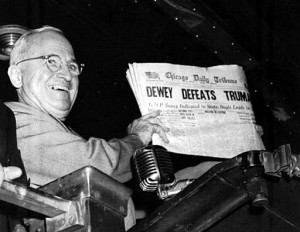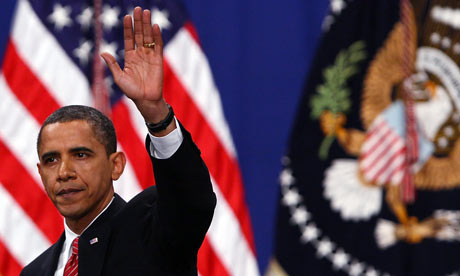A sample text widget
Etiam pulvinar consectetur dolor sed malesuada. Ut convallis
euismod dolor nec pretium. Nunc ut tristique massa.
Nam sodales mi vitae dolor ullamcorper et vulputate enim accumsan.
Morbi orci magna, tincidunt vitae molestie nec, molestie at mi. Nulla nulla lorem,
suscipit in posuere in, interdum non magna.
|
60 years ago, when Harry Truman beat Tom Dewey for the presidency, it was widely predicted by pollsters that Truman would lose. This led to the famous “Dewey Beats Truman” headline in the newspaper proudy flashed by the winning candidate.

The problem, it was later revealed, was that the Gallup organization based its poll results on responses to telephone inquiries. But in the late 1940s, that selection inevitably favored wealthier Republicans, leading to skewed poll results.
Gallup is best known for that one half-century-old blunder. There’s a terrible irony in that. The studious George Gallup did more than anyone to put opinion polling on solid ground.
We have a similar problem today, it appears to me. While telephone subscribership has now become ubiquitous, increasingly many citizens — especially twenty-somethings — no longer use landline telephones, instead going completely wireless. The proportion was 1 in 6 three years ago and continues to increase steadily. Pollsters, however, still base their surveys on landline phone subscribers. In fact, under FCC regulations it is unlawful to telephone a wireless subscriber for a “solicitation” or using an autodialer (a technical prerequisite to modern polling) without either their consent or a prior business relationship. Therefore, despite a non-profit exemption in the FCC’s rules (which, unlike the Federal Trade Commission’s “telemarketing sales rule,” do not expressly exempt political polling), the law is standing in the way of accurate political predictions.
How this will play out in next Tuesday’s elections is unclear to me, as I claim no special expertise in political punditry. But it is revealing that the problems experienced in 1948 are recurring today in a different form due to technological change and the accelerating proliferation of wireless communications devices.
Saudi Arabians will now need a governmental license to post on Twitter.
TechCrunch reports that the Saudi royal family has decreed that Tweets must pass government approval. That’s a reaction to June 2009′s so-called “Green Revolution” in Iran, where Twitter became an instrument for crowd-sourced demonstrations and altering Western media to repression.

http://techcrunch.com/2010/09/23/saudi-arabians-will-soon-need-a-license-to-b…
Andrew Keen says that Twitter is inconsequential politically. The House of Saud and Mahmoud Ahmadinejad most definitely disagree. So do I. Social Media, Freedom & Revolution | Fear & Loathing.
Shared through Social – The Facebook app for the iPad via my iPad
It is completely beyond my why the Obama Administration and congressional Democrats could be this obtuse. No one should want — and I doubt any American really does support — the government standardizing serving sizes and recipe compositions, even on health grounds.
Remarkably, Section 4205 of the new health reform law, which requires chain restaurants and vending machines to provide nutrition notices, instructs the HHS Secretary to:
Consider standardization of recipes and methods of preparation, in reasonable variation in serving size and formula of menu items, space on menus and menu boards, inadvertent human error, training of food service workers, variations in ingredients…
HHS Secretary to Regulate Serving Sizes and Recipes for Cheeseburgers and Fries | John Goodman. Who could have known? That’s in part because the provision literally was buried:
You’ve heard the phrase “buried in the bill,” of course. Section 4205 of the “Patient Protection and Affordable Care Act,” the health care reform bill President Obama signed on March 23, 2010 is contained on pages 1206-14 of a 2407 page bill. It could hardly be more buried than that.
Food Lability Law Blog.

And so, America has gone from “Cheeseburger in Paradise” to “I Can Has Cheeseburger” to self-proclaimed “reformer” rants against Five Guys burgers as Xtreme Eating. What a country! It’s all well and good that Ms. Obama’s pet issue is childhood obesity, but outlawing fatty and big meals will, like illegal drugs, just make them more desirable. So this proposal for more government will inevitably backfire, as well as being totally repulsive from a civil liberties standpoint.
The U.S. Supreme Court, for the first time, took note of social media today, observing that “soon … it may be that Internet sources, such as blogs and social networking Web sites, will provide citizens with significant information about political candidates and issues.”
This landmark event occurred in Citizens United v. FEC, a case overturning the McCain-Feingold 2002 campaign reform legislation which required corporations to fund “electioneering communications” through PACs. Supreme Court Removes Limits on Corporate, Labor Donations to Campaigns [Fox]. So get ready to see explicit corporate-funded movies, TV spots, Twitter campaigns and Facebook fan pages furthering their political views every November.

Whether that is good or bad for American democracy I will leave to readers’ own judgments.
Rapid changes in technology—and the creative dynamic inherent in the concept of free expression—counsel against upholding a law that restricts political speech in certain media or by certain speakers. See Part II–C, supra. Today, 30-second television ads may be the most effective way to convey a political message. See McConnell, supra, at 261 (opinion of SCALIA, J.). Soon, however, it may be that Internet sources, such as blogs and social networking Web sites, will provide citizens with significant informa- tion about political candidates and issues. Yet, §441b would seem to ban a blog post expressly advocating the election or defeat of a candidate if that blog were created with corporate funds. See 2 U. S. C. §441b(a); MCFL, supra, at 249. The First Amendment does not permit Congress to make these categorical distinctions based on the corporate identity of the speaker and the content of the political speech.
 Hearing Room It is hard to understand how “conference reports” from Congress on pending legislation can have fallen from 200 per year to just 11 over the past three decades. Secret Bill Writing On the Rise [Washington Post]. But it indicates, sadly, that laws in America are increasingly being made in back rooms, not the public forums our system of politics has traditionally used. That may be mere window-dressing, but it is IMPORTANT symbolically, in my view.
In a letter to C-SPAN Chairman Brian Lamb, House Republican leader John Boehner wrote, “Unfortunately, the president, Speaker (Nancy) Pelosi and Senate Majority Leader (Harry) Reid now intend to shut out the American people at the most critical hour by skipping a bipartisan conference committee and hammering out a final health care bill in secret.” The complaint sounded a lot like one nine years ago, when Sen. Kent Conrad, D-N.D., said Republicans “locked out the Democrats from the conference committee” meeting on the budget. “We were invited to the first meeting and told we would not be invited back, that the Republican majority was going to write this budget all on their own, which they have done. So much for bipartisanship.”
It’s not a good political sign at all that liberals seem to be departing the president in droves. The more things “change,” the more it appears politicians give us more of the same.
As the Nation’s Pulse Races, Obama Can’t Seem to Find His [NYTimes.com].
President Obama’s favorite word is “unprecedented,” as Carol Lee of Politico pointed out. Yet he often seems mired in the past as well, letting his hallmark legislation get loaded up with old-school bribes and pork; surrounding himself with Clintonites; continuing the Bushies’ penchant for secrecy and expansive executive privilege; doubling down in Afghanistan while acting as though he’s getting out; and failing to capitalize on snazzy new technology while agencies thumb through printouts and continue their old turf battles.
So with Al Quaeda essentially not hiding in Afghanistan — and certainly not operating terrorist training camps any more — why should the United States care about the Talban and a political “insurgency”? Our role is not to maintain of support the “national security forces” of third-world countries. Civil wars are the business of those fighting them. President Obama set a deadline, but this deployment has no defined mission and no clear objective. And for centuries Afghanistan has been the graveyard of foreign armies, including the Soviet Union. This is a tried-and-true recipe for disaster.

US General McChrystal Vows to Take Battle to Taliban [The Guardian].
McChrystal drew a distinction between al-Qaeda terrorists operating in Afghanistan, who he said were few in number and largely limited to non-combat support roles, and insurgents such as the Taliban. “What we are actually going to do is degrade al-Qaeda and prevent them being a threat and build up Afghan national security forces so they can deal with it effectively and so they will need less help. “We can significantly impact Taliban capacity in the timeframe of 18 months. We need to convince them … that [the insurgency] is a losing proposition.”
Posted via web from glenn’s posterous
Speech is indeed effectively free in the age of YouTube. So that does undermine the scarcity argument traditionally used for the (now-defunct) “fairness doctrine” and the like. But some conservative pundits, like Gordon Crovitz in the Wall Street Journal today, argue this makes political campaign contribution limits both obsolete and unconstitutional. Why Campaign Political Speech Restrictions on Unions and Corporations Make No Sense [WSJ.com].
The problem is that while speech is free, campaign $$ is not. Crovitz equates money with political speech, something the Supreme Court did (erroneously in my view) way back in the 1970s in upholding some, but not all, Watergate-era campaign spending and contribution limits. That does not mean, as he implies, that restricting corporate political contributions is “silly,” because Cravitz’s own analysis shows that it is communication where technology has leveled the playing field, not political campaigns, with all their expensive pre-Web 2.0 trappings like air travel, rally planing and event staging.
In his defense, what Crovitz appears to be saying is that bans on pure corporate political speech, rather than monetary contributions, are problematic:
Whatever the arguments for blocking direct contributions by corporations and unions, McCain-Feingold goes beyond this and directly limits First Amendment speech. The Constitution doesn’t promise “equal” speech, just the freedom to speak.
I agree with that. But the premise that “direct contributions” are different should be the start, not a footnote, to this debate.
As Mike Madden writes today in Salon, of course “social media is documenting the Iranian revolution — not leading it.” But that still requires media exposure, coordination and communication, all of which Twitter supplies in spades. No, social media will not bring down Ahmadinejad, the Iranian people can only do that. Imagine if Tom Paine in 1775 or Cory Aquino in 1987 had the one-to-many power of social networking communication instead of pamphlets and radio. Just as “Internet time” speeds up the old world, so too does social media — whether China, Iran or otherwise — provide a new and powerful tool for political revolution.

Posted via email from glenn’s posterous
I have tremendous respect for Prof. Larry Lessig of Stanford — developer of the Creative Commons license, author of Code and Other Laws of Cyberspace and a strong open-source software advocate. One of his most famous essays, from early in the Internet era, was titled “What Declan Doesn’t Get.” But Larry is also a dreamer, taking positions that as a practical matter are idealistic, not realistic. This one, I think, epitomizes that character trait. Lessig (and Others) Asks Candidates to Make Debates More Open [Post I.T.].
Who ever said these were really “debates” anyway? Lincoln-Douglas they are not, having calcified into a series of scripted mini stump speeches, in which the candidates are given a platform to offer bromides but never pressed by the media or engaged with each other. So to suggest that “new media,” bloggers and the like should participate misses the whole point. Major party candidates don’t want to debate. They like the dominance of debates by legacy television media; that’s the whole point, to STAY in their political comfort zone. It’s all good and well to propose otherwise, it’s just quixotic because no one who matters cares.
|
|







